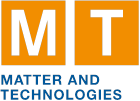Speaker
Description
Transition Edge Sensors (TES) are superconducting microcalorimeters that can be used for
single-photon detection at extremely low backgrounds. When they are within their supercon-
ducting transition region ($\sim80~$mK for the TES in this work) small temperature fluctuations -
like the energy deposited by single photons - lead to large variations in resistance. These varia-
tions can be measured using Superconducting Quantum Interference Devices (SQUIDs). This
exciting technology will be used as a single-photon detector for the upcoming ALPS II exper-
iment, a light-shining-through-walls experiment at DESY Hamburg, searching for Axion-Like
Particles (ALPs), which are possible Dark Matter (DM) candidates. At ALPS II the detector
needs to detect single photons with a wavelength of 1064 nm at a rate of $\sim10^{−5}~$Hz leading
to very stringent dark count requirements. Therefore, the main challenges in commissioning
a TES for ALPS II involve determining and increasing its detection efficiency and reducing
dark counts as well as backgrounds introduced by e.g. black-body radiation. Due to the very
low dark count rates in our setup, our TES system might be viable for direct DM searches at
sub-MeV masses using electron-scattering of DM in the superconducting material, as well.
In this talk, the commissioning of a TES for the ALPS II experiment will be discussed, followed
by an outlook on the possible application of TESs as detectors for direct DM searches.

